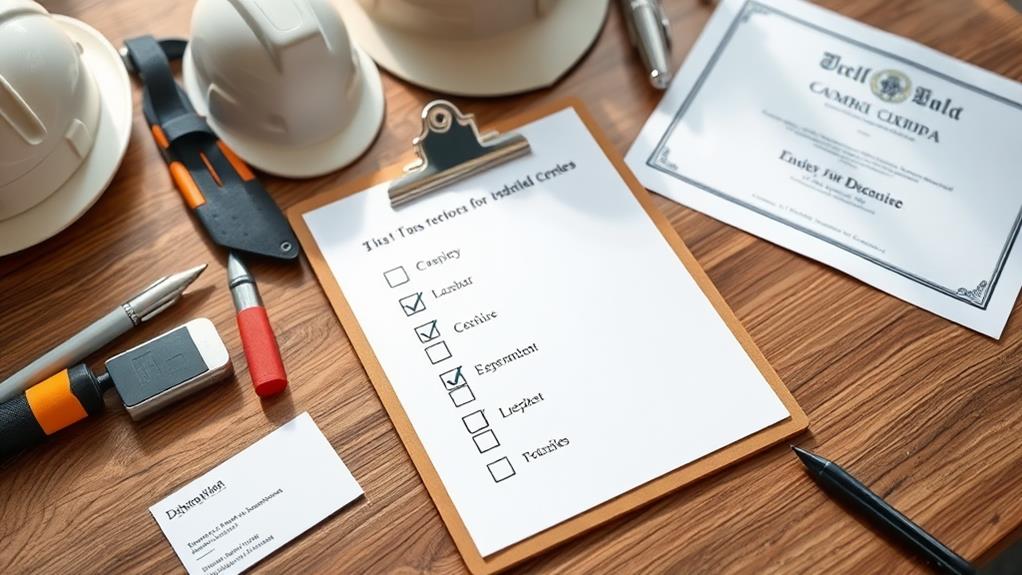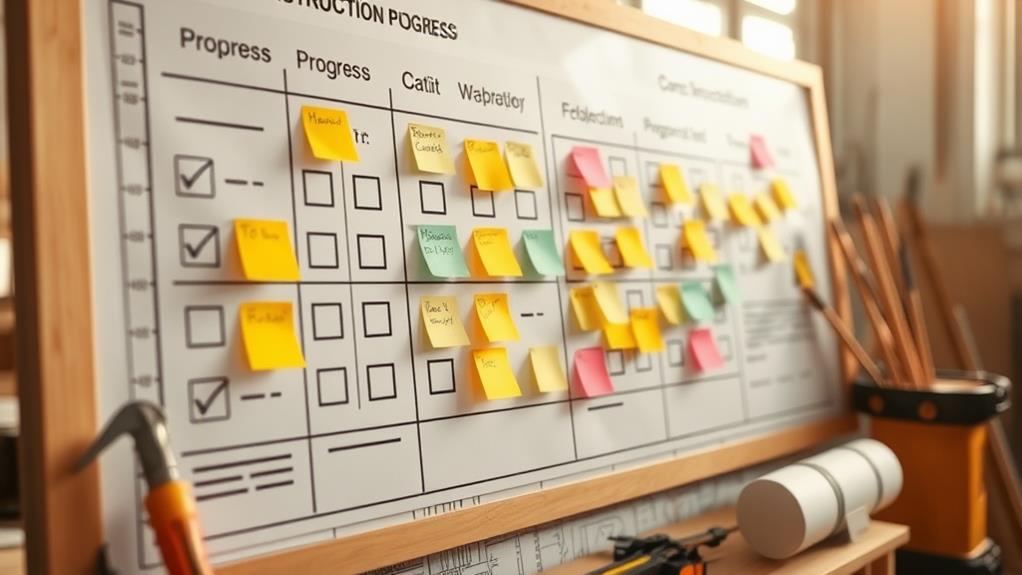Choosing a local contractor involves several important steps to guarantee quality work. Start by gathering recommendations from friends and family, and research online reviews. Next, verify the contractor's credentials, including licensing and experience, to confirm they're qualified. Conduct interviews to assess professionalism and communication. It's vital to develop a detailed contract outlining the scope of work and payment terms. Understanding permits and inspections is also essential, as this can prevent delays. Finally, monitor the project's progress and maintain open communication. By following these steps, you'll make a well-informed decision on your contractor choice. More tips await you!
Gather Recommendations and Research

When choosing a local contractor, gathering recommendations and conducting thorough research is vital. Start by asking friends and family who've recently completed similar projects. Their personal experiences often give you realistic assessments of a contractor's performance.
You can also consult neighbors who've undergone renovations; they can share insights about their contractor selection process and satisfaction levels. Additionally, make sure that the contractors you consider have the appropriate licensing and insurance to protect yourself during the project.
Utilizing professional associations like the National Association of the Remodeling Industry (NARI) and the National Association of Home Builders (NAHB) can help you access lists of qualified local contractors.
Moreover, speaking with building inspectors and local lumberyard employees can provide you with valuable insights into contractors' reliability and quality of work in your area.
Don't forget to conduct thorough online research, too. Reading reviews and testimonials on platforms like Yelp and Angie's List will help you gauge a contractor's reputation and past client satisfaction.
This approach not only assists in finding a reputable contractor but also enhances your consumer protection. By gathering recommendations and doing your homework, you'll feel more confident in your choice, ensuring a smoother and more successful project ahead.
Conduct Interviews and Meetings
When you start conducting interviews, begin with phone calls to ask key questions about the contractor's experience and project sizes.
This initial contact can help you gauge their expertise and reliability before you meet in person.
A face-to-face assessment is also essential, as it lets you observe their professionalism and how well they communicate your ideas.
Phone Interview Questions
Conducting a phone interview with potential contractors can save you time and help you make informed decisions. Start by asking about their experience with projects similar in size and scope to yours. This guarantees they can handle your specific needs effectively.
Next, inquire about their current workload. How many projects are they managing at the same time? This can give you insight into their availability and ability to commit to your project.
It's also wise to request financial references from suppliers or banks. This aids you in assessing the contractor's financial stability and reliability.
Additionally, discuss their preferred method of communication. How quickly do they respond to messages? Understanding their communication style will help you gauge how well they'll keep you updated throughout your project.
Lastly, clarify their approach to subcontractor relationships. Ask how long they've worked with their subcontractors and what their working dynamic is like. This information can give you a clearer picture of the stability and quality of the team they'll bring to your project.
Face-to-Face Assessment
Face-to-face meetings with potential contractors are essential for evaluating their professionalism and communication style. During these meetings, you'll want to assess how well they respond to your project details and concerns.
Start by asking about their experience with similar projects. This can give you insight into their stability and reliability.
Don't forget to request a list of previous clients. This step helps you verify the contractor's credibility and understand how satisfied others have been with their work.
Pay attention to how they interact with you during the discussion. Good communication is significant, so observe their listening skills and engagement. Effective communication will be critical for a successful collaboration throughout your project.
Make certain to discuss your project details extensively. This guarantees the contractor understands your vision and can address any specific requirements you may have.
A contractor who takes the time to listen and engage with your ideas shows that they value your input.
Ultimately, face-to-face meetings help you get a clearer picture of which contractor will be the best fit for your needs, enhancing the likelihood of a successful project outcome.
Verify Credentials and Experience

When you're choosing a local contractor, it's essential to check their licensing status to guarantee they're legally certified to work in your area.
You should also assess their relevant experience by asking for examples of similar projects they've completed. This step not only confirms their qualifications but also helps you feel more confident in their ability to meet your renovation needs.
Check Licensing Status
A contractor's licensing status is crucial for ensuring you're hiring someone legally qualified for your project. To verify this status, check with local authorities to confirm that the contractor has the necessary licenses for the work you're considering.
Different jobs may require specific certifications, like electrical or plumbing licenses, so make sure the contractor has those if applicable.
It's also important to review the contractor's experience. Ask how long they've been in business and if they've handled projects similar to yours before. This can give you insight into their competence and ability to meet your needs.
Additionally, look into any disciplinary actions or complaints filed against the contractor through state licensing boards. This can help you gauge their reliability and professionalism.
Assess Relevant Experience
After confirming a contractor's licensing status, it's important to assess their relevant experience to ascertain they can handle your specific project.
Evaluating a contractor's experience guarantees you're selecting someone equipped for the work you need done. Here are some steps to follow:
- Request a Portfolio: Ask for examples of similar projects they've completed. This gives you an idea of their capabilities and quality of work.
- Check Online Reviews: Look for testimonials from past clients. Focus on feedback related to the specific type of work you require, as this can highlight their reliability.
- Inquire About Subcontractors: Ask how they manage subcontractors. A contractor's experience with these professionals can show their ability to efficiently oversee your project.
- Verify Insurance Coverage: Ascertain the contractor has liability and workers' compensation insurance. This protects you from potential financial loss due to accidents or damages on the job site.
Develop a Detailed Contract
Developing a detailed contract is crucial for a successful project, as it sets clear expectations for both you and your contractor. Start by creating a thorough contract that outlines the specific scope of work, including the materials and labor required. This will help prevent misunderstandings during the project. Use a contractor checklist to guarantee you cover all necessary aspects.
Next, clearly define the payment schedule within the contract. Specify the deposit amount, progress payments, and the final payment upon completion. This transparency helps you and your contractor stay on the same page financially. Additionally, include timelines for project completion, which will help manage your expectations regarding the timeline and budget.
It's also important to incorporate clauses for change orders and unexpected costs. This way, you can manage adjustments in project needs without disputes.
Negotiate Payment Terms

Negotiating payment terms with your contractor can greatly impact the success of your project. Establishing a clear payment schedule can help guarantee that work is completed to your satisfaction before you release further funds.
Here are some tips to take into account:
- Avoid large upfront payments: A good practice is to pay 10% at signing, 25% at intervals, and 15% upon project completion. This helps mitigate financial risk for you.
- Link payments to milestones: Set specific project milestones for payments. This keeps the contractor motivated to complete your project on time and as expected.
- Include lien releases: Make it a requirement in the contract to obtain lien releases. This protects you from potential claims if the contractor fails to pay suppliers.
- Maintain open communication: Regularly discuss financial matters and address any concerns promptly. This helps guarantee that both you and the contractor are on the same page regarding the payment schedule.
Understand Permits and Inspections
Maneuvering the complexities of permits and inspections is crucial for any construction project. When you start planning your project, it's imperative to understand permits and who'll handle them. Typically, contractors are responsible for obtaining the necessary paperwork, but you should clarify this during discussions. This way, you can avoid potential project delays or compliance issues later on.
Building permits guarantee your project aligns with local codes and regulations. Depending on your location, these requirements can vary, so it's important that your contractor is knowledgeable about local inspection needs.
Regular inspections should be scheduled throughout the project to catch any issues early, guaranteeing quality and adherence to safety standards. Missing inspections or failing to secure the proper permits can lead to fines or the need to redo work, which can be frustrating.
Monitor Progress and Communication

Once you've secured the necessary permits and inspections, keeping an eye on the project's progress becomes essential. Effective communication with your contractor helps guarantee quality work and adherence to project timelines.
Here are some tips to help you monitor progress and maintain open communication:
- Schedule Regular Site Visits: Make it a point to visit the work site consistently. This way, you can inspect the quality of work and guarantee it aligns with your expectations.
- Maintain Consistent Communication: Stay in touch with your contractor to address any issues or changes that come up during your home renovation. Quick responses can prevent bigger problems later.
- Utilize a Tracking System: Document all communications, agreements, and changes. This promotes transparency and accountability, guaranteeing everyone is on the same page.
- Review Timelines and Budgets: Regularly compare the project's progress against established milestones. Identifying any deviations early can help keep the project on track.
Conclusion
Choosing the right local contractor can make all the difference in your project's success. Did you know that nearly 70% of homeowners regret their contractor choice? By gathering recommendations, verifying credentials, and developing a clear contract, you can avoid becoming part of that statistic. Remember, good communication and monitoring progress are key. Take your time in this process, and you'll be more likely to find a contractor who meets your needs and brings your vision to life.


Leave a Reply